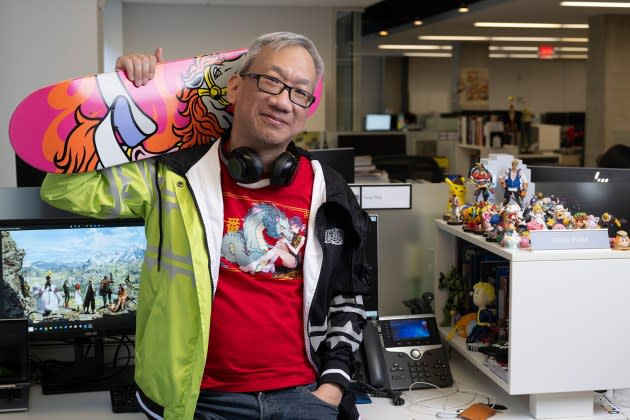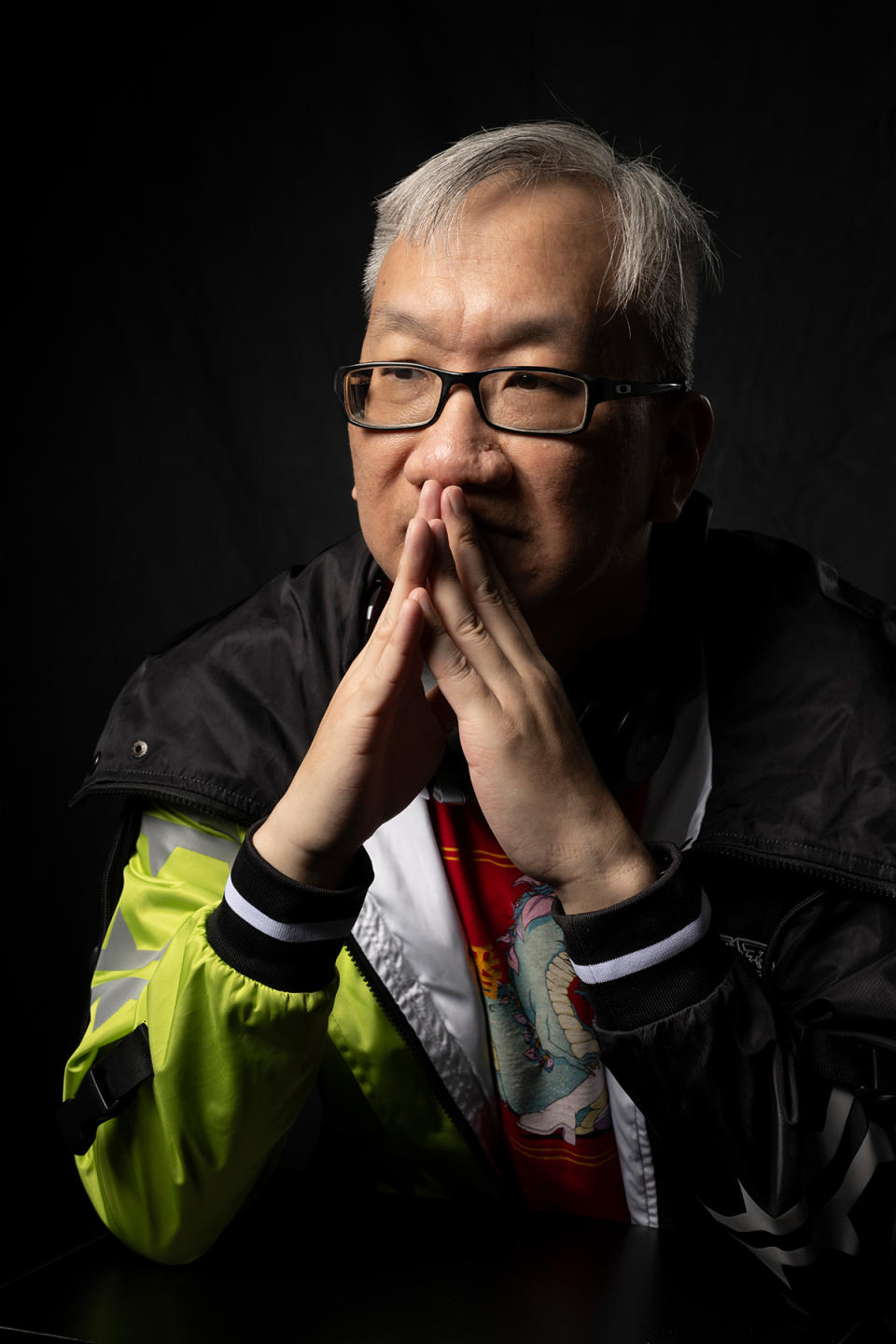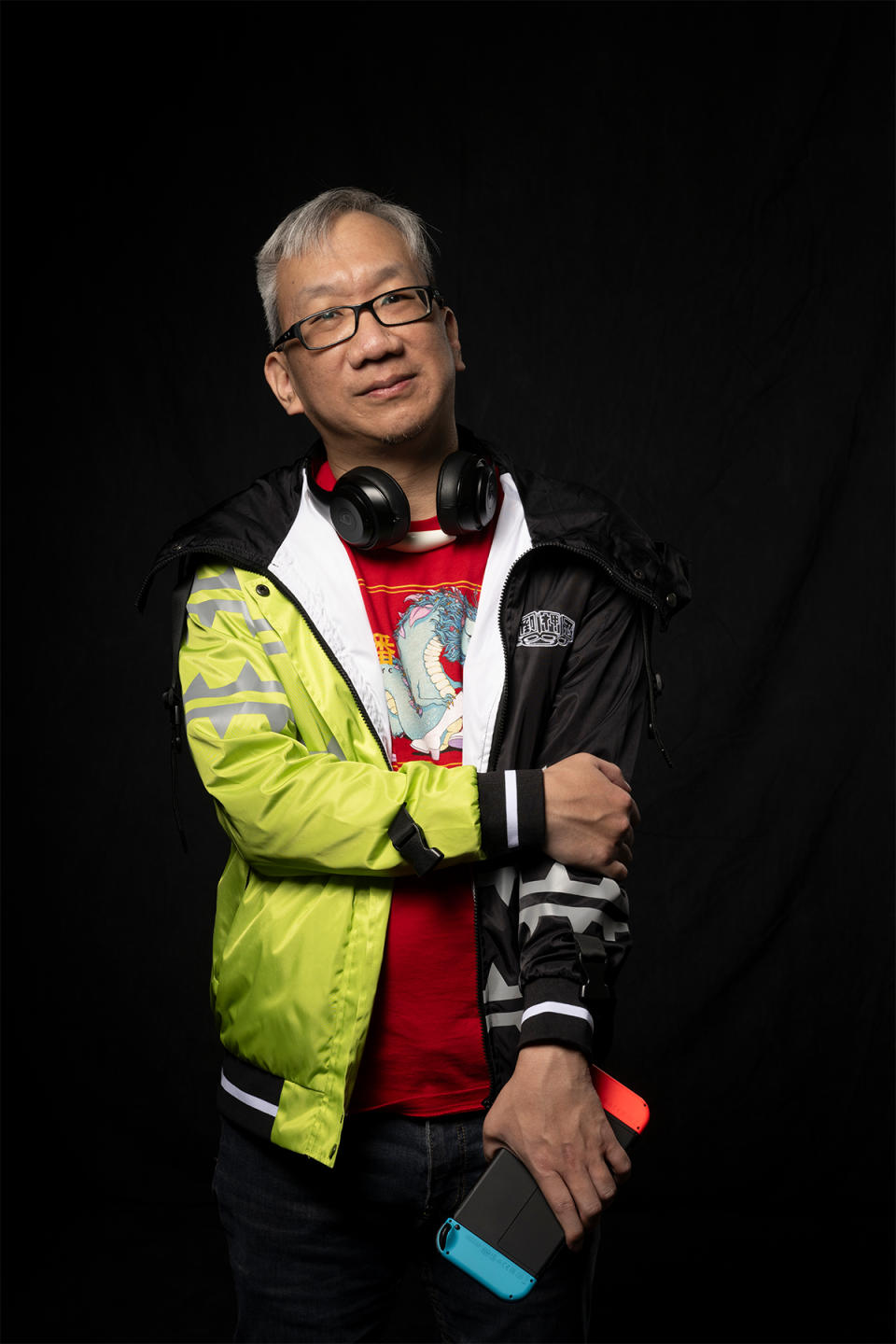‘It Helped Me Embody Someone Else’: How ‘Cyberpunk 2077’ Helped Gene Park Battle Cancer

In 2022, like many gamers, Gene Park booted up Cyberpunk 2077, the latest open-world RPG. The futuristic video game by the makers of The Witcher depicts a world full of neon lights and cybernetic enhancements, and it had recently received a big content update. Controller in hand, Park vividly recalls directing a digital Keanu Reeves to try and stop a murder, all while medical tubes protruded from his body. The tubes plugged into a port on his torso, and they were ready to pump chemicals inside. Unlike the digital augments that buffed his video game character, chemotherapy is corrosive in a way that makes the experience invasive, even as it was helping. Park likens it to having poison being poured into his heart.
Park is no ordinary gamer, of course. Park, 42, has built a career off of covering the medium for readers at The Washington Post, where he has the privilege of meeting gaming’s biggest names. He’s interviewed everyone from the creator of Zelda, to the mind behind Metal Gear Solid. His work at The Post has helped usher in a more humanistic approach to gaming journalism, one that’s accessible to mainstream audiences while retaining his encyclopedic knowledge and appreciation for the medium. What he didn’t know was how important that love would become during one of the most difficult times of his life.
More from Rolling Stone
'Senua's Saga: Hellblade II' Is a Movie Masquerading as a Game. It Falls Short on Both
RS Recommends: The Best Xbox Series X/S Games To Play in 2024
Being a gaming reporter is an unusual job, and not one that he planned for, exactly. Before settling down at the newspaper, he’d done everything from sleeping on a nuclear powered aircraft carrier and has judged beauty pageants. While he couldn’t have predicted where he’d end up, Park knew one thing from a young age: video games were more than a mere distraction. At first, he was convinced that games were going to be the defining art form of our lifetimes. But since surviving cancer, Park has inadvertently made a much more poignant argument about the medium and its power: Games can be a lifeline that make the senseless cruelties of existing more bearable.
Growing up in Guam, a small island where things move slowly, Park had to be patient to play the latest games. For one thing, they were expensive back in the 1990s. A single copy of Street Fighter II would go for $110, and it took Park months to save up for it, even with some help from his parents.
Friends would bring back games like Super Mario Bros. from the States, and while these titles were purchased in mundane places like supermarkets, for Park, the novelty made it akin to finding buried treasure. Being close to Asia meant that games were easy to import, but they were in Japanese. The language barrier didn’t stop him from playing, but it did mean that pivotal story beats, like the death of Aerith in Final Fantasy VII, went over his head. It didn’t matter, though. Park and his friends would still take turns playing that single copy of the PS1 classic until the in-game timer stalled at 99 hours and 99 minutes.

It was at age 15 that his mother pushed him to pursue his interests seriously. She knew he loved writing, so she suggested getting a job at the local paper. While covering music didn’t work out in the long-term, it did kick off Park’s future in covering the arts. And for Park, video games felt destined to become a cultural phenomenon. The world just didn’t know it yet.
The first time he applied to The Washington Post, Park was rejected. But he wasn’t deterred, and ended up successfully applying for another job there in 2015. At first, Park’s job dealt with audience analytics, but the Post wanted to kickstart its gaming coverage amid an exploding esports scene. Park and his lifelong love of video games were a natural fit.
In 2022, Gene’s world came crashing down. At first, all he knew was that he was ill. The endless fatigue made him suspect long Covid and its myriad complications, but then he started getting emaciated, dropping to a mere 120 pounds. A gastroenterologist later delivered the news: Park had colon cancer, and would need surgery. Soon after, he’d need to start chemotherapy.
When Park announced the news, he declared that he wanted to turn his story into one of survivorship. It would be a fight, he knew, but one that could be won. It was during this time that Park was playing Cyberpunk 2077, a highly controversial game. The developers had initially released something that strayed deeply from the expectations set by hyperbolic marketing. It was such a shock for some that Sony pulled the unprecedented move of giving out large-scale refunds for the game, no questions asked. But for Park, the game acted like a balm in tough times.
“It helped me embody someone else,” Park says. “My body has betrayed me, my body is trying to kill me. And so if I can envision myself in someone else’s body, it’s a transformative experience.”
Cyberpunk 2077 was an outlet, but it wasn’t entirely an escapist experience. In some ways, it let him forget about his circumstances, but in others, it helped him process his situation better.
“I’d be sitting in my chair with all these tubes sticking out of me, playing a cyberpunk [game] about this man who’s willingly altered his body, and who is trying to figure his way out of it.”
The game largely deals with the cost of survivorship, and how living through trauma can weigh on the soul. Park wanted to live, he says, but surviving was a complicated thing in itself. Park fended off colon cancer, only to learn in 2023 that he had a new malignant tumor. Treatment was successful in both cases, but the process took a permanent toll on him. He can’t walk or go to the bathroom as easily as he once did. Park was also plagued with an ongoing sense of survivor’s guilt. He has lost two friends to cancer, both of them relatively recently, and they were on his mind through the entire ordeal.
“I would listen to videos of them talking, just to hear them,” Park recalls. “It felt like they were guiding me through, even though I felt like I was gonna see them again.”

Nowadays, it’s hard for Park to go back to the games that kept him company during his fight against cancer. But where an experience like this might make most reconfigure their entire life, for Park, it was further confirmation that he’d been using his time on earth wisely all along. The closest parallel for his experience, he says, is a story beat depicted in Like A Dragon: Infinite Wealth, which features a protagonist who also has cancer. The Japanese action RPG series is notorious for giving players mini-games, and in this installment, the player can visit an arcade. It’s here, Park says, that the protagonist starts talking about all the different games he still wants to play, even though death is lurking in the horizon.
“I’ve always had an existential crisis about dying and not [getting] to experience the next Mario game,” Park confesses. While there are still things Park wants to accomplish, like interviewing the creator of Metal Gear Solid about his fixation with death, the sentiment depicted in Like A Dragon is familiar to him. The protagonist wants to live forever so he can keep discovering new worlds. The character felt like “there are so many games I want to play, that I want to experience before I go,” Park says, recounting both the character’s sentiment as well as his own. “It’s too bad that we don’t have enough time.”
Park can now say he’s a survivor of Stage 4 cancer, and while there’s some emotional turmoil there, he doesn’t lose sight of his fortune. “It sounds like such a cliche for cancer patients to say every day is a gift, but it’s true. It’s true, you know? And so for me, every time I was alive, I was like, here’s another chance to keep fighting.”
Best of Rolling Stone

